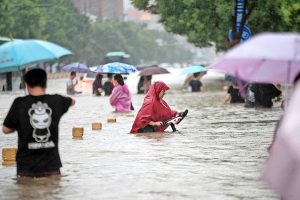
14 Oct Japan AI tech to be deployed in PHL for disaster management
THE Japan International Cooperation Agency (JICA) said it has partnered with Japanese company Spectee, Inc. to upgrade the Philippine disaster risk reduction and management (DRRM) system using artificial intelligence (AI) technology.
In a statement, JICA said this was a collaboration among JICA, the Department of Information and Communications Technology (DICT), and Spectee, Inc.
“JICA, through its Public-Private Partnership Promotion Program, tapped the prominent technology of Spectee, a Japanese private company that developed an innovative yet affordable DRRM technology,” it said in a statement on Monday.
The cloud-based technology helps government agencies rapidly collect, process, and communicate critical information in times of disaster.
Spectee Pro is a real-time crisis management information system that uses AI image and language analysis to extract useful data points from social networking sites.
JICA said while this was widely used by the government, private companies, and media organizations in Japan, JICA, and Spectee intend to create a Philippine version with the assistance of the DICT.
JICA Senior Representative Oshima Jiro and DICT Assistant Secretary for Infostructure Management Philip A. Varilla signed the Minutes of the Meeting as the collaboration agreement document on Sept. 24, at the DICT Quezon City office.
On the same day, Spectee, Inc. Chief Operating Officer Negoro Satoshi, joined the signing virtually from Tokyo, JICA said.
“We strongly believe that our AI Disaster & Crisis Management Solution Spectee Pro can contribute to strengthening the resilience of the Philippines facing increasing natural disasters caused by climate change,” Mr. Negoro said.
The Philippines is the most at risk of natural disasters such as earthquakes, typhoons, and volcanic eruptions, according to the 2024 World Risk Report.
Spectee Pro will be provided free of charge for a time to an initial list of 80 government agencies and local government units. This includes Metro Manila, Legazpi City, Tagbilaran City, Tacloban City, Cebu City, and Davao City.
“Apart from training and simulations, there will be a constant feedback mechanism, taking into account actual conditions on the ground, to ensure that any improvements made to the system are relevant and useful to the end users,” JICA said. — Beatriz Marie D. Cruz
